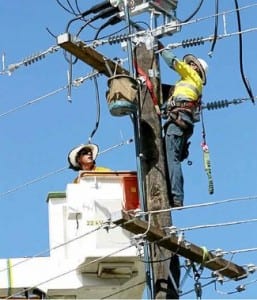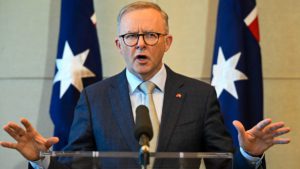Network operator Ergon Energy is to purchase twenty 100 kilowatt hour lithium-ion batteries to be installed in locations across its grid in regional Queensland.
Chief executive officer Ian McLeod confirmed the procurement process was virtually complete and a winning tender had been selected. He did not name the successful tender, but said an announcement would be made soon.
Over the past year, Ergon has been talking up the potential of energy storage to help relieve pressure on network costs that have driven up electricity prices.
Until now it was not known what type or how many batteries Ergon would install.
“We have just finished a procurement process whereby we are buying twenty 100 kilowatt hour lithium-ion units,” McLeod said in an interview. “They will be placed around the network to correct voltage quality and capacity issues.”
McLeod made the comments after delivering a presentation to the Northern Development Summit in Townsville, where he said energy storage would greatly improve efficiency of electricity networks in regional areas.
The summit was organised by leadership group ADC Forum to discuss issues affecting the future of Northern Australia, including mining, agriculture, population growth and national security. It was attended by leaders from government and industry, including Minister for Trade and Investment Andrew Robb and Northern Territory Chief Minister Adam Giles.
Ergon’s new batteries will be charged by the grid during off-peak periods at night and discharge during peak periods in the daytime, relieving pressure on the grid during peak times. The strategy is expected to save “hundreds of millions of dollars” in network costs, such as substations, poles and wires.
McLeod said the challenges of running the network over such a sparsely populated area meant energy storage was most beneficial in regional areas.
“These technologies commercially stack up quicker in Ergon’s patch than they do elsewhere,” he said. “Using renewables, demand management and storage in those locations stacks up commercially for us and for the customer.”
Ergon aims to install the first batteries at various locations within twelve months and then ramp up installation of the other batteries in the following twelve months.
McLeod told the summit Ergon had spent heavily on its network over the past decade, but the emphasis was now on reducing network spending to keep electricity prices down.
“Customers are now actually investing in their own installations, rather than the network,” he said. “The challenge for us is to make sure we are not investing in the network at the same time.
“We have cut $1.5 billion off the current program over the last five years and our spend over the next period will be lower. Our target is to keep network prices at below CPI and all our modeling at this point in time says we will achieve that.”
He said about $500 million had been saved in the current program by implementing measures such as energy conservation and demand management strategy strategies.
Ergon also sees battery technology being used in other ways. The business is conducting a trial of solar PVs with on-grid batteries at scale.
Other pilots have been undertaken with residential energy storage. “If you put batteries in (a home,) it will reduce infrastructure costs and the customers will be paying half the cost that they charge on off peak,” he told the summit.
“(The homeowner) can put the cost of the batteries into the capital costs of the house. Everybody wins at of that scenario.”
Ergon has one of the least dense networks in the developed world, covering 1.7 million square kilometres and 160,000 km of power lines and serving 715,000 customers.
See also
https://reneweconomy.wpengine.com/2014/ergon-wants-keep-new-solar-grid-37767









